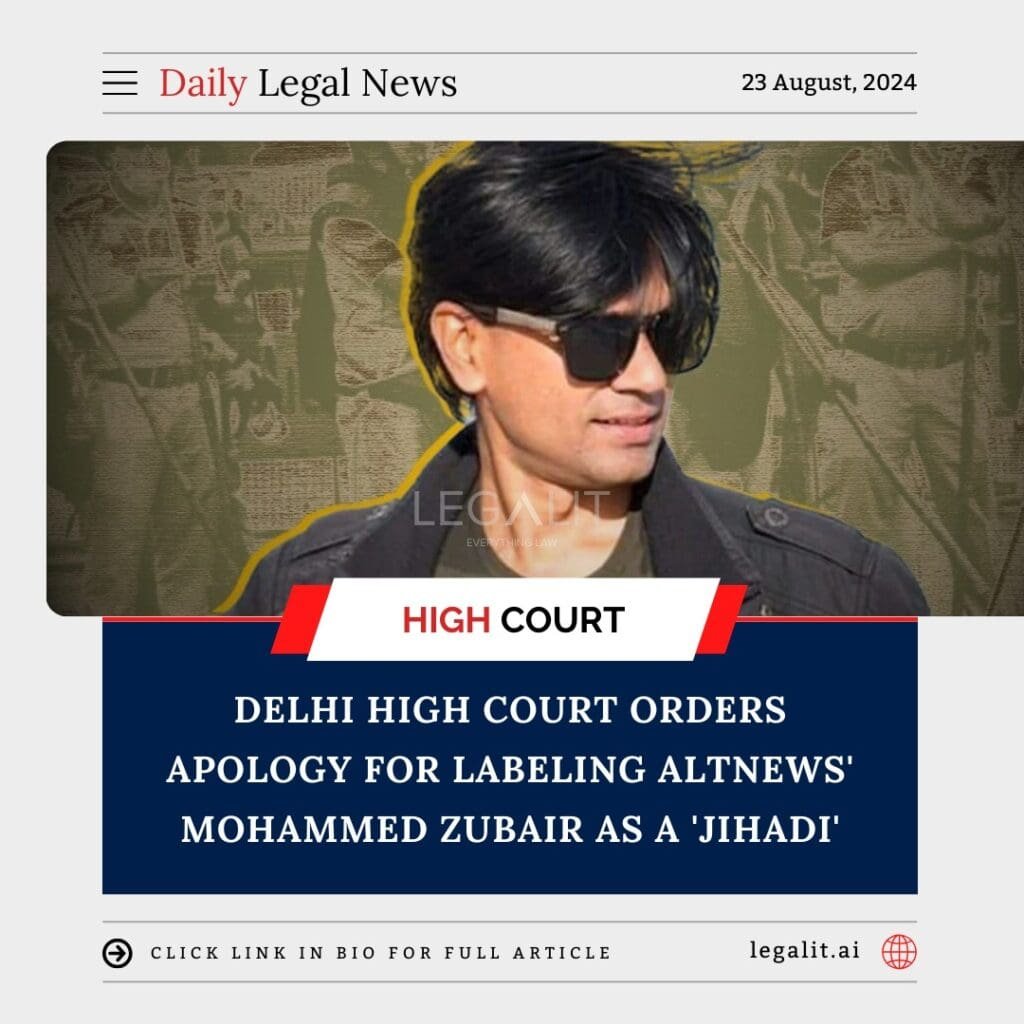
In a landmark ruling that underscores the judiciary’s role in combating defamation and protecting individual reputations, the Delhi High Court has mandated a public apology from a man who labeled Mohammed Zubair, a prominent journalist and co-founder of AltNews, as a ‘jihadi’. The court’s decision highlights the legal and ethical implications of making defamatory statements and reaffirms the importance of responsible discourse in public and media platforms.
Background of the Case:
- The Defamatory Statement: The case centers on allegations against an individual who made derogatory remarks about Mohammed Zubair, a well-known fact-checker and journalist associated with AltNews. The statement in question, which labeled Zubair as a ‘jihadi’, was made on a public platform and quickly garnered significant attention. The term, which carries heavy connotations, was deemed by Zubair as not only false but also damaging to his personal and professional reputation.
- Legal Action: In response to the defamatory remarks, Zubair pursued legal action, seeking redress for the harm caused by the statement. The case was brought before the Delhi High Court, where it was argued that the use of such inflammatory and baseless labels constituted defamation and was intended to malign Zubair’s character.
Court’s Decision:
- Order for Public Apology: The Delhi High Court ruled in favor of Mohammed Zubair, determining that the statement made by the defendant was defamatory and unjustified. The court ordered the individual to issue a public apology, acknowledging the harm caused by the remarks and retracting the derogatory label. The apology is to be made through the same platform where the original statement was posted, ensuring that the retraction reaches the same audience.
- Legal Reasoning: The court’s decision was based on principles of defamation law, which protects individuals from false statements that can damage their reputation. The ruling emphasized that public figures, including journalists and activists, are entitled to protection from unwarranted and harmful attacks. The court’s reasoning reinforces the legal standard that defamatory statements must be based on factual evidence and not driven by prejudice or malice.
Implications of the Ruling:
- Impact on Defamation Cases: The ruling serves as a significant precedent in defamation cases, particularly those involving public figures and media professionals. It underscores the judiciary’s commitment to safeguarding reputations and ensuring that defamatory statements are addressed appropriately. The requirement for a public apology also highlights the importance of accountability in maintaining ethical standards in public discourse.
- Protection of Journalists and Activists: The decision reinforces the need to protect journalists and activists from false and defamatory attacks. As public figures who often face scrutiny and criticism, individuals like Mohammed Zubair rely on legal recourse to defend their integrity and ensure that their work is not undermined by baseless accusations.
- Role of Social Media and Public Discourse: The case highlights the powerful role of social media and other public platforms in spreading information—and misinformation. The court’s order for a public apology through the same platform as the original statement underscores the responsibility of individuals and organizations to correct false information and mitigate the damage caused by defamatory remarks.
Broader Context and Considerations:
- Defamation and Free Speech: The balance between protecting individuals from defamation and upholding the right to free speech is a complex legal issue. The court’s decision in this case illustrates how the judiciary navigates this balance, emphasizing that while free speech is a fundamental right, it does not extend to making false and damaging statements about others.
- Accountability in Public Discourse: The case serves as a reminder of the need for accountability in public discourse. As public figures and ordinary citizens engage in debates and discussions, it is crucial to ensure that statements are made responsibly and with respect for others’ reputations.
- Legal Remedies for Defamation: The ruling provides a clear example of the legal remedies available for those who have been defamed. By securing a public apology, Zubair has taken a significant step in addressing the harm caused by the defamatory remarks and setting a precedent for similar cases in the future.
Conclusion:
The Delhi High Court’s order for a public apology in the defamation case involving Mohammed Zubair underscores the judiciary’s role in upholding standards of fairness and integrity in public discourse. The ruling highlights the importance of responsible communication and the need to address and rectify false and damaging statements. As the legal landscape continues to evolve, this case serves as an important reminder of the balance between free speech and the protection of individual reputations, reinforcing the principles of accountability and justice in both traditional and digital media.